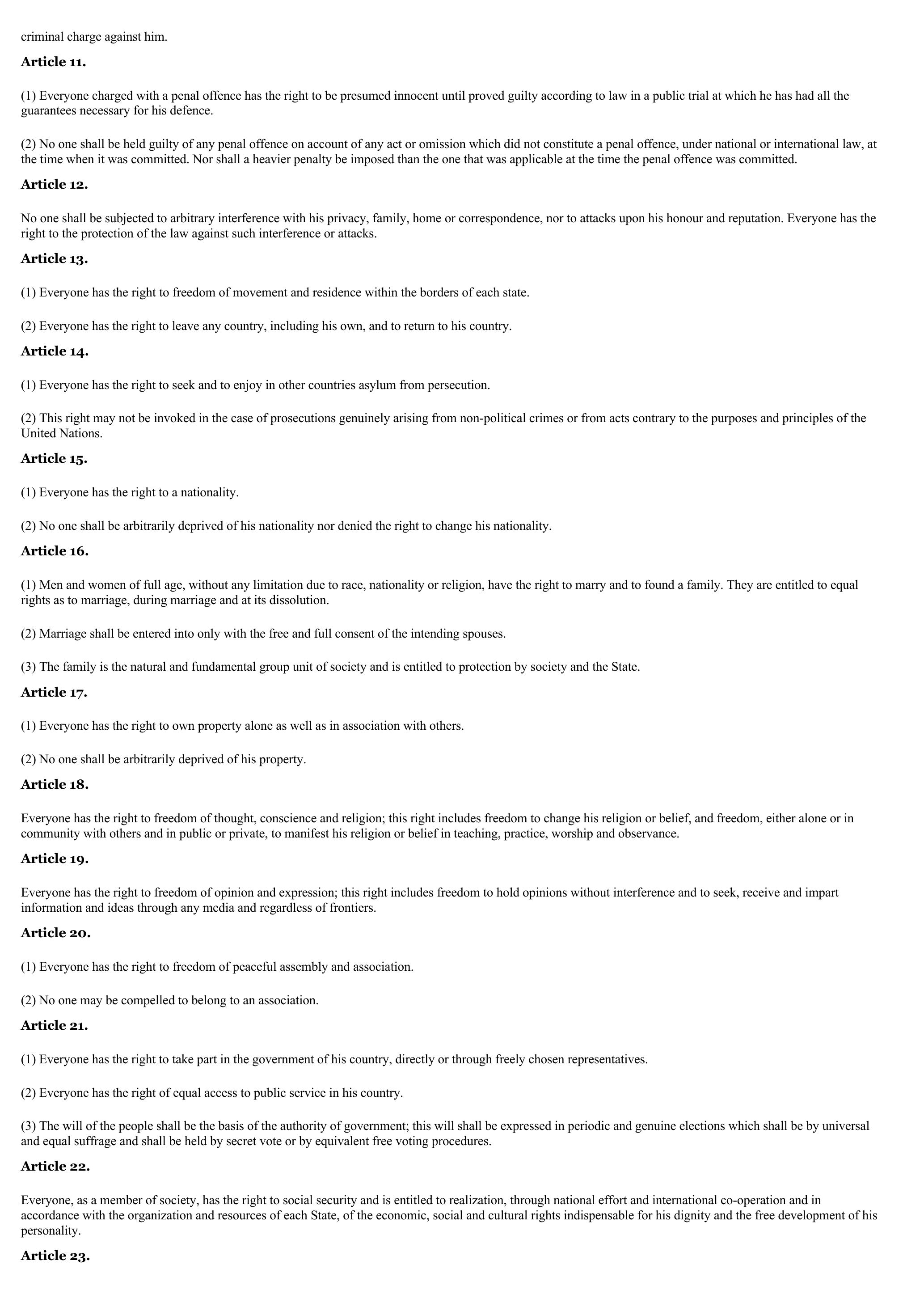Universal Declaration of Human Rights The Universal Declaration of Human Rights--adopted by the United Nations (UN) in 1948--gave human rights a new international legal status.
Publié le 26/05/2013

Extrait du document
«
criminal charge against him.
Article 11.
(1) Everyone charged with a penal offence has the right to be presumed innocent until proved guilty according to law in a public trial at which he has had all theguarantees necessary for his defence.
(2) No one shall be held guilty of any penal offence on account of any act or omission which did not constitute a penal offence, under national or international law, atthe time when it was committed.
Nor shall a heavier penalty be imposed than the one that was applicable at the time the penal offence was committed.
Article 12.
No one shall be subjected to arbitrary interference with his privacy, family, home or correspondence, nor to attacks upon his honour and reputation.
Everyone has theright to the protection of the law against such interference or attacks.
Article 13.
(1) Everyone has the right to freedom of movement and residence within the borders of each state.
(2) Everyone has the right to leave any country, including his own, and to return to his country.
Article 14.
(1) Everyone has the right to seek and to enjoy in other countries asylum from persecution.
(2) This right may not be invoked in the case of prosecutions genuinely arising from non-political crimes or from acts contrary to the purposes and principles of theUnited Nations.
Article 15.
(1) Everyone has the right to a nationality.
(2) No one shall be arbitrarily deprived of his nationality nor denied the right to change his nationality.
Article 16.
(1) Men and women of full age, without any limitation due to race, nationality or religion, have the right to marry and to found a family.
They are entitled to equalrights as to marriage, during marriage and at its dissolution. (2) Marriage shall be entered into only with the free and full consent of the intending spouses. (3) The family is the natural and fundamental group unit of society and is entitled to protection by society and the State. Article 17. (1) Everyone has the right to own property alone as well as in association with others. (2) No one shall be arbitrarily deprived of his property. Article 18. Everyone has the right to freedom of thought, conscience and religion; this right includes freedom to change his religion or belief, and freedom, either alone or incommunity with others and in public or private, to manifest his religion or belief in teaching, practice, worship and observance. Article 19. Everyone has the right to freedom of opinion and expression; this right includes freedom to hold opinions without interference and to seek, receive and impartinformation and ideas through any media and regardless of frontiers. Article 20. (1) Everyone has the right to freedom of peaceful assembly and association. (2) No one may be compelled to belong to an association. Article 21. (1) Everyone has the right to take part in the government of his country, directly or through freely chosen representatives. (2) Everyone has the right of equal access to public service in his country. (3) The will of the people shall be the basis of the authority of government; this will shall be expressed in periodic and genuine elections which shall be by universaland equal suffrage and shall be held by secret vote or by equivalent free voting procedures. Article 22. Everyone, as a member of society, has the right to social security and is entitled to realization, through national effort and international co-operation and inaccordance with the organization and resources of each State, of the economic, social and cultural rights indispensable for his dignity and the free development of hispersonality. Article 23.. »
↓↓↓ APERÇU DU DOCUMENT ↓↓↓
Liens utiles
- Declaration by United Nations Soon after the bombing of Pearl Harbor on December 7, 1941, British prime minister Winston Churchill met with United States president Franklin D.
- Thomas Jefferson I INTRODUCTION Thomas Jefferson (1743-1826), third president of the United States (1801-1809) and author of the Declaration of Independence.
- Daw Aung San Suu Kyi Daw Aung San Suu Kyi, born in 1945, leader of the nonviolent movement for human rights and the restoration of democracy in Myanmar (formerly known as Burma), and winner of the Nobel Peace Prize in 1991.
- Civil Rights Movement in the United States - U.
- The Rights of Man Declaration With this declaration, the French National Assembly addressed many of the French people's grievances with the monarchy and established the ideals of the French Revolution.

































